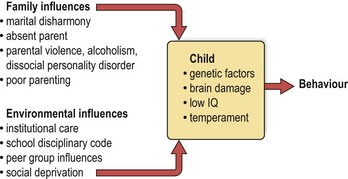Child psychiatry II
Conduct disorder
There are two types of conduct disorder:
 Socialised conduct disorder. These children are able to make friends who usually also behave in an antisocial way. The bad behaviour is therefore usually most evident away from home. Relationships with adults may be good, although there are often difficulties with authority figures.
Socialised conduct disorder. These children are able to make friends who usually also behave in an antisocial way. The bad behaviour is therefore usually most evident away from home. Relationships with adults may be good, although there are often difficulties with authority figures. Unsocialised conduct disorder. These children do not have friends, either because they have been rejected by their peers or because they deliberately choose to isolate themselves. The antisocial behaviour therefore occurs alone. Some degree of emotional disorder is often also present in these children.
Unsocialised conduct disorder. These children do not have friends, either because they have been rejected by their peers or because they deliberately choose to isolate themselves. The antisocial behaviour therefore occurs alone. Some degree of emotional disorder is often also present in these children.The causes of conduct disorders are a complex interaction between the biological make-up of the child, family influences and environmental factors as summarised in Figure 1. The style of parenting is thought to be important. Conduct disorders are likely to develop if parents fail to give clear boundaries, monitor behaviour and administer ineffective or inconsistent discipline. Improving parenting skills is likely to improve behaviour even if other causative factors are present. Other treatment approaches include family therapy, behavioural therapy, remedial teaching and provision of alternative peer group activities. The outcome is better for the socialised group. Two-thirds of the unsocialised group will have persisting dissocial behaviour in adulthood.
Stay updated, free articles. Join our Telegram channel

Full access? Get Clinical Tree




